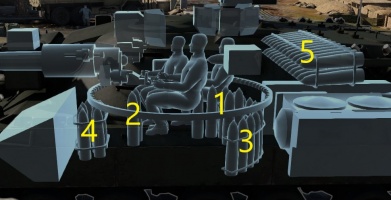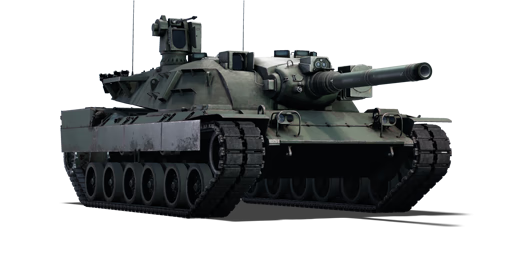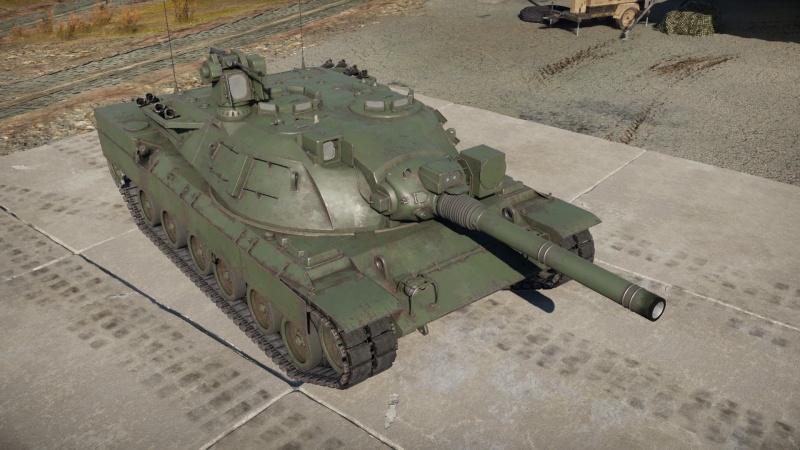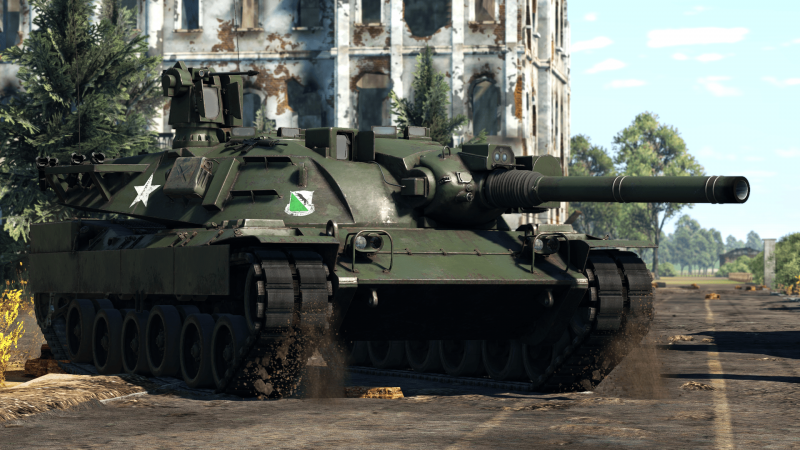XM803
Contents
Description
The Tank, Combat, Full-Tracked, 152 mm Gun/Launcher XM-803, developed from the MBT-70, was part of the abandoned collaborative U.S. and West German initiative to develop a new main battle tank to replace the existing M60 family of MBT during the 1960s. The program experienced significant challenges from the start, with the United States Army and the German Bundeswehr having diverging doctrines that were not coordinated and were not resolved before the project was too far along to be modified. By the late 1960s, West Germany abandoned the project and the U.S. solely funded the project for the next few years. The MBT-70 was redesigned and designated the XM-803, as an attempt to modify the MBT-70 design into a low-cost substitution using entirely U.S.-made components, resulting in the strikingly similar XM-803 prototype. The biggest cost savings came from switching to less expensive steel armour plates. Costs were also decreased by using an engine built in the U.S. instead of West Germany. The prototype was a little heavier and a little slower compared to the original MBT-70. Despite these savings, the XM-803 design began to match the MBT-70 in sophistication as development progressed and was ultimately terminated. The XM-803 program was cancelled by Congress in December 1971, and work on a new tank program began, the XM-1, which ultimately resulted in the production-model M1 Abrams MBT.
Introduced in Update 1.79 "Project X", the XM-803 offers players unique insights into the pathway of U.S. tank development that ultimately leads to the current-day M1 Abrams MBT. Despite the program's eventual demise, the XM-803 gives several unique capabilities for Cold War U.S. Army ground forces players, particularly the capacity to launch anti-tank guided missiles from the gun barrel, which is unusual in Western MBTs but prevalent in Soviet MBTs. The XM-803 performs very similarly to its ancestor, the MBT-70; however, it suffers from a slightly lower top speed and lacks the original 20 mm cannon mounted on the turret roof. Overall, the MBT strikes a good balance between protection, speed, and firepower, allowing players to easily engage most threats.
General info
Survivability and armour
The XM-803's frontal armour is only effective versus full-calibre AP and APHE rounds and certain APDS rounds. Almost all large calibre (76 mm and up) sabot rounds will have no trouble slicing through it, even when hitting the frontal armour at an angle. Large calibre HEAT-FS has no problem going through it too, although the large fuel tank behind the frontal hull armour can sometimes absorb a lot of the damage. The fuel tank is also completely separate from the rest of the tank, and as a result, often burns out without damaging the rest of the vehicle. The spaced armour proves effective against HESH rounds as the spall generated upon detonation on the external armour will be soaked by the underlying layers, significantly reducing the damaging effect of the round. One big weak spot on the turret is the left turret cheek (the right from the view of the tank commander). This is because this part of the turret is not protected by spaced armour and only consists of a 177.8 mm thick CHA plate, which most chemical and kinetic energy projectiles can penetrate with ease.
Armour type:
- Spaced armour (Hull front, Turret front)
- Rolled homogeneous armour
- Cast homogeneous armour
| Armour | Front (Slope angle) | Sides | Rear | Roof |
|---|---|---|---|---|
| Hull | 38.1 mm (64°) Front glacis 76 mm (63°) Lower glacis |
35 mm Top 25.4 mm Bottom |
25.4 mm (12°) Top 25.4 mm (67°) Bottom 5 mm (13°) Engine exhaust |
25.4 mm Front 5-12.7 mm Engine deck |
| Turret | 38.1-203 mm (0-75°) | 12.7-38.1* mm (29-34°) | 12.7* mm (27-84°) | 25.4-76 mm Front 12.7 mm Rear turret |
| Cupola | 25.4 mm | 25.4 mm | 25.4 mm | 25.4 mm |
| Spaced armour* | Front | Sides | Rear |
|---|---|---|---|
| Hull | 250 mm Kinetic 240 mm Chemical |
N/A | N/A |
| Turret | 270-300 mm Kinetic 220-350 mm Chemical |
38 mm sections: 200 mm Kinetic 220 mm Chemical 12.7 mm sections: 50 mm Kinetic 60 mm Chemical |
30 mm Kinetic 40 mm Chemical |
Notes:
- Road wheels are 20 mm thick and tracks are 30 mm thick.
- A 6.35 mm RHA plate separates the engine from the crew compartment
- The crew is protected by a 6.35mm thick turret basket
- Hull spaced armour configuration is 38 mm RHA + 127 mm air + 51 mm RHA.
- Turret spaced armour configuration is 38 mm RHA + 127 mm air + 127 mm CHA.
- Turret rear side spaced armour configuration is 12.7 mm RHA + 38 mm air + 25.4 mm RHA
- Turret rear spaced armour configuration is 12.7 mm RHA + 38 mm air + 12.7 mm RHA.
Mobility
| Game Mode | Max Speed (km/h) | Weight (tons) | Engine power (horsepower) | Power-to-weight ratio (hp/ton) | |||
|---|---|---|---|---|---|---|---|
| Forward | Reverse | Stock | Upgraded | Stock | Upgraded | ||
| Arcade | 72 | 33 | 51.7 | 1,937 | 2,385 | 37.47 | 46.13 |
| Realistic | 64 | 30 | 1,106 | 1,250 | 21.39 | 24.18 | |
The mobility of the XM803 is worse than that of the MBT-70. In its stock configuration, it has a horsepower/ton ratio of 21.39, while with all upgrades this increases to 24.08 HP/t. The top speed (both forward and reverse) is 64 km/h (40 mph) with 8 gears for both directions. The tank can reach its top speed quickly on flat roads, while on more difficult terrain the top speed drops by around 20 km/h. The tank has neutral steering and good turning ability on all terrains.
Modifications and economy
Armaments
Main armament
| 152 mm XM150E5 | Turret rotation speed (°/s) | Reloading rate rounds (seconds) | Reloading rate ATGM (seconds) | ||||||||
|---|---|---|---|---|---|---|---|---|---|---|---|
| Mode | Capacity | Vertical | Horizontal | Stabilizer | Stock | Upgraded | Full | Expert | Aced | Autoloader | Autoloader |
| Arcade | 53 | -10°/+20° | ±180° | Two-plane | 40.0 | 55.4 | 67.2 | 74.3 | 79.1 | 7.50 | 10.00 |
| Realistic | 25.0 | 29.4 | 35.7 | 39.5 | 42.0 | ||||||
Ammunition
| Penetration statistics | |||||||
|---|---|---|---|---|---|---|---|
| Ammunition | Type of warhead |
Penetration @ 0° Angle of Attack (mm) | |||||
| 10 m | 100 m | 500 m | 1,000 m | 1,500 m | 2,000 m | ||
| XM578E1 | APFSDS | 285 | 281 | 270 | 254 | 239 | 223 |
| M409A1 | HEAT | 380 | 380 | 380 | 380 | 380 | 380 |
| MGM-51C | ATGM | 431 | 431 | 431 | 431 | 431 | 431 |
| Shell details | ||||||||||||
|---|---|---|---|---|---|---|---|---|---|---|---|---|
| Ammunition | Type of warhead |
Velocity (m/s) |
Projectile mass (kg) |
Fuse delay (m) |
Fuse sensitivity (mm) |
Explosive mass (TNT equivalent) (kg) |
Ricochet | |||||
| 0% | 50% | 100% | ||||||||||
| XM578E1 | APFSDS | 1,509 | 3.79 | - | - | - | 78° | 80° | 81° | |||
| M409A1 | HEAT | 754 | 18.9 | 0.05 | 0.1 | 3.73 | 62° | 69° | 73° | |||
| Missile details | ||||||||||||
|---|---|---|---|---|---|---|---|---|---|---|---|---|
| Ammunition | Type of warhead |
Velocity (m/s) |
Range (m) |
Projectile mass (kg) |
Fuse delay (m) |
Fuse sensitivity (mm) |
Explosive mass (TNT equivalent) (kg) |
Ricochet | ||||
| 0% | 50% | 100% | ||||||||||
| MGM-51C | ATGM | 286 | 3,200 | 27.8 | 0.05 | 0.1 | 5.72 | 80° | 82° | 90° | ||
| Smoke shell characteristics | ||||||
|---|---|---|---|---|---|---|
| Ammunition | Velocity (m/s) |
Projectile mass (kg) |
Screen radius (m) |
Screen deploy time (s) |
Screen hold time (s) |
Explosive mass (TNT equivalent) (g) |
| XM410E1 | 754 | 18.9 | 21 | 5 | 30 | 50 |
Ammo racks

| Full ammo |
1st rack empty |
2nd rack empty |
3rd rack empty |
4th rack empty |
5th rack empty |
Visual discrepancy |
|---|---|---|---|---|---|---|
| 53 | 48 (+5) | 46 (+7) | 34 (+19) | 27 (+26) | 1 (+52) | No |
Notes:
- Rack 5 is a first-stage ammo rack, meaning it depletes first but refills from the other racks in the order they are listed. As such, it is the last rack to deplete.
Machine guns
| 12.7 mm M85 | ||||
|---|---|---|---|---|
| Mount | Capacity (Belt) | Fire rate | Vertical | Horizontal |
| Pintle | 1,080 (180) | 626 | -15°/+60° | ±180° |
| 7.62 mm M73 | ||||
|---|---|---|---|---|
| Mount | Capacity (Belt) | Fire rate | Vertical | Horizontal |
| Coaxial | 6,000 (250) | 500 | - | - |
Usage in battles
The XM-803, like the MBT-70, is a very good flanker. To get the most out of this tank, you must use its high speed and acceleration to flank the enemy or set up ambushes. Its gun and ammunition are good enough to penetrate most tanks of a lower BR with ease, although when up-tiered, you will have to resort to aiming for the weak spots of opponents. The HEAT round you get is free, and will easily penetrate tanks with plain steel armour, however its shortcomings are very apparent when fired against composite armour. The lower muzzle velocity of the shell also makes it difficult to lead shots and to account for the range whilst stock. The APFSDS round has decent penetration and will defeat most armour it faces. It also has very high muzzle velocity, almost 1,500 m/s, making aiming at longer ranges easy. The ATGM which comes stock can be very useful, especially when first unlocking the vehicle. Though it has an increased reload time of 12 seconds, it can extend your engagement distance significantly if you lack the necessary means otherwise.
When faced with an enemy around a corner, one can attempt to bait shots by only exposing the frontal hull - opponents will often shoot this, only to find, much to their dismay, that there is nothing of value inside and you may not even have to use your fire extinguisher to put it out due to the fact that it is separate from the rest of the tank.
While the armour may seem formidable at first, it struggles to fend off most other rounds at its battle rating, failing to stop most other APFSDS or HEAT-FS rounds. This lack-lustre protection is instead compensated by its other characteristics such as its excellent mobility and usage of an auto-loader.
Pros and cons
Pros:
- Good selection of ammunition types (Stock ATGM, stock HEAT shell, APFSDS)
- The ATGMs can be fired at any time, even when not stationary.
- Good mobility and acceleration, high speed both forwards and backwards
- Top mounted .50 cal can allow you to damage low-flying aircraft
- Frontal Fuel tank behind the spaced armour which can sometimes absorb enemy chemical effect rounds
- Steady reload time thanks to the autoloader: losing a crew member will not impact the reload speed, and it still functions when putting out a fire
- Has smoke grenade launchers
- Turret mantlet is strong, can even resist certain APFSDS rounds
- Features a hydropneumatic suspension which can have its clearance raised or lowered
- Excellent dual zoom of 8x and 12x
Cons:
- The spaced armour is not composite armour and cannot provide adequate protection against most guns of its rank
- Frontal armour can be penetrated even by some APHE rounds
- Weak sides and LFP
- Only the clearance can be adjusted with the hydropneumatic suspension
- Ammo racks are large, can be easily hit, and do not have blowout panels
- Vulnerable to the rear due to raised engine deck
- Cramped interior, loss of more than one crew member more likely when penetrated
- Poor roof armour protection on the ammo and engine section
- Chemical projectiles (HEAT and ATGM) will struggle a lot at this battle rating as vehicles with ERA protection are common, especially on Soviet vehicles.
History
Once it became apparent that the MBT-70 project was doomed to fail in the early '70s due to high costs and reliability issues, the U.S. Congress decided to cut their losses on the project by cancelling the MBT-70, and instead, diverted funding to the development of a new project called XM803.
The XM803 was, in essence, envisioned to be a "budget version" of the MBT-70. Although the new vehicle would heavily be based on the MBT-70, inheriting many of its design solutions, it would also try to drastically reduce production costs by using more conventional and only American-made parts. Although this meant that the XM803 had to give up some of its high-tech equipment in favour of lower production costs, it was projected that the influence of these changes on the XM803's combat performance would be minimal.
Despite showing favourable performance and being seen as a promising design by the Army, the XM803 still remained a comparably expensive tank to produce even with the applied changes over the MBT-70. Moreover, neither the MBT-70 nor the XM803 seemed to offer any substantial increase in combat performance over the already in service M60 Patton to justify the high production cost. This ultimately led to the Congress cancelling work on the XM803 only a short while after the cancellation of the MBT-70. In the late 1970s, some funding of the two failed projects would, later on, find its way to support the development of an entirely new, but this time around, more conventional tank project. That tank, of course, being the legendary M1 Abrams itself.
- From Devblog
Media
- Skins
- Videos
See also
- Related development
- Similar vehicles with large-calibre gun/launcher systems:
External links
| General Motors Company (GM) | |
|---|---|
| MBTs | |
| MBT-70 | MBT-70* · XM803 |
| XM-1 | XM1 (GM) |
| *Designed in collaboration with the Deutsche Entwicklungsgesellschaft. | |
| Tank Destroyers | T114 |
| Export | |
| GMC CCKW | CCKW 353 (M45) · CCKW 353 AA |
| Note | General Motors has several divisions, including Buick, Cadillac, and Chevrolet. |
| USA medium tanks | |
|---|---|
| M2 | M2 |
| M3 | M3 Lee · ▃Grant I |
| M4 | M4 · Calliope · M4A1 · M4A1 (76) W · M4A2 · M4A2 (76) W · M4A3 (105) · M4A3 (76) W · M4/T26 |
| M26 Pershing | T20 · T25 · M26 · M26 T99 · M26E1 |
| M46/47/48 Patton | M46 · M46 "Tiger" · M47 · M48A1 · T54E1 · T54E2 |
| M60 | M60 · M60A1 (AOS) · M60A1 RISE (P) · M60A2 · M60A3 TTS · M728 CEV · 120S |
| MBT-70 | MBT-70 · XM803 |
| M1 Abrams | XM1 (Chrysler) · XM1 (GM) |
| M1 Abrams · M1 KVT · IPM1 | |
| M1A1 · M1A1 HC · M1A1 Click-Bait | |
| M1A2 Abrams · M1A2 SEP · M1A2 SEP V2 | |
| Other | T95E1 |
| Australia | M1A1 AIM |
| Canada | M4A5 |
| Israel | ▃Magach 3 (ERA) · ▃Merkava Mk.1 · ▃Merkava Mk.2B · ▃Merkava Mk.3D |
| Turkey | M60 AMBT |






